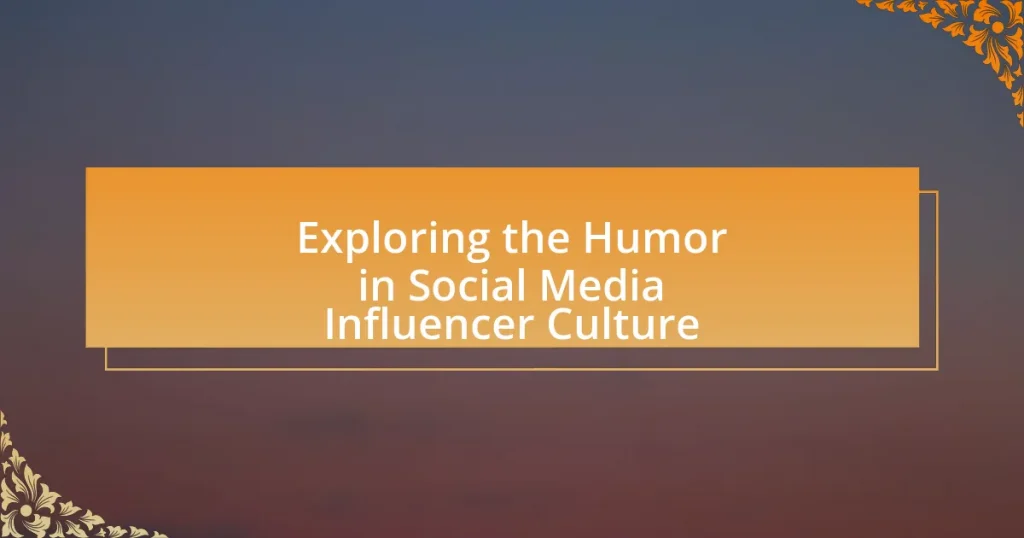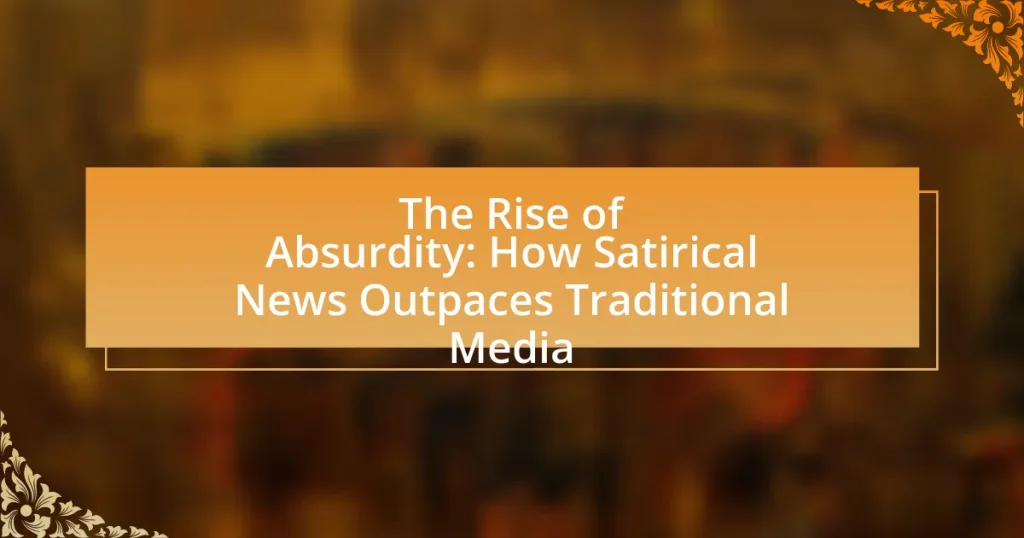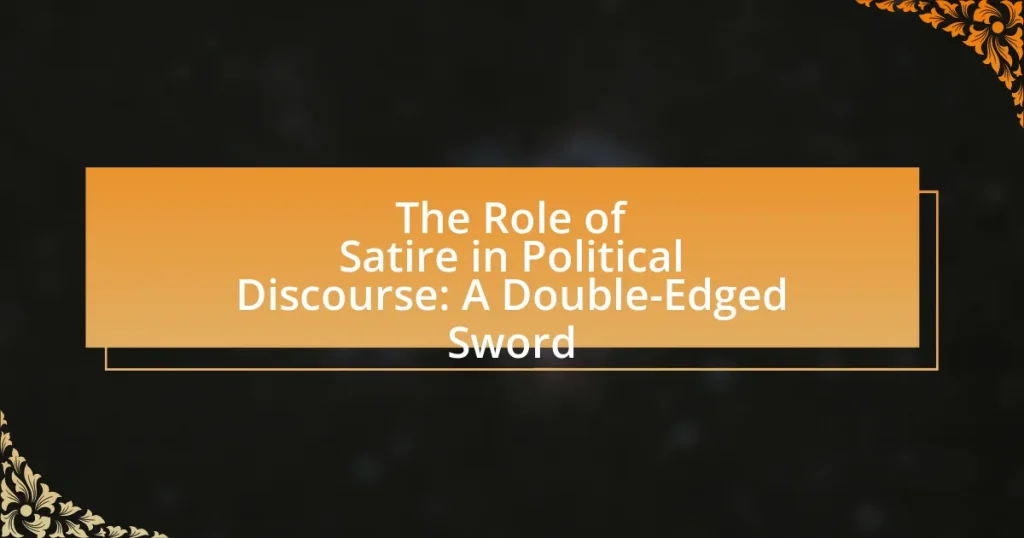The article explores the role of humor in social media influencer culture, highlighting its significance in engaging audiences and enhancing relatability. It examines various comedic techniques used by influencers, such as self-deprecating humor, satire, and memes, and discusses how these methods foster community and connection among followers. The article also addresses the importance of tailoring humor to audience preferences, the impact of humor on brand perception and loyalty, and the evolving trends in influencer humor, including the rise of authenticity and meme culture. Additionally, it outlines best practices for brands to effectively leverage humor in influencer partnerships to enhance engagement and brand visibility.
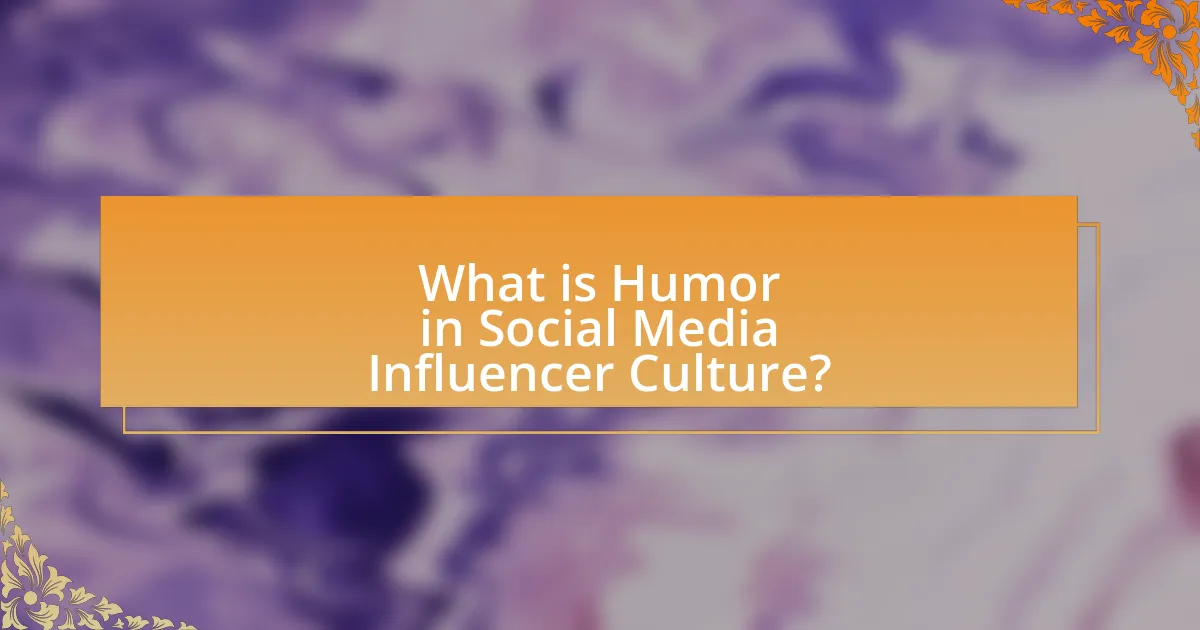
What is Humor in Social Media Influencer Culture?
Humor in social media influencer culture refers to the use of comedic elements by influencers to engage their audience and enhance relatability. Influencers often employ memes, satire, and self-deprecating humor to create content that resonates with their followers, fostering a sense of community and connection. Research indicates that humor can increase audience engagement, with studies showing that humorous posts receive higher interaction rates compared to non-humorous content. For instance, a study published in the Journal of Marketing Research found that humor in advertising significantly boosts consumer engagement and brand recall, highlighting its effectiveness in influencer marketing.
How does humor manifest in influencer content?
Humor in influencer content manifests through various techniques such as satire, parody, relatable anecdotes, and visual comedy. Influencers often use these methods to engage their audience, create a sense of community, and enhance relatability. For instance, a study by the Pew Research Center found that 72% of teens believe that humor is a key factor in their connection with influencers, indicating its significant role in content effectiveness. Additionally, influencers frequently employ memes and trending jokes to resonate with their followers, leveraging current cultural references to maintain relevance and foster engagement.
What types of humor are commonly used by influencers?
Influencers commonly use various types of humor, including self-deprecating humor, observational humor, and satire. Self-deprecating humor allows influencers to connect with their audience by poking fun at themselves, making them appear relatable. Observational humor involves commenting on everyday situations in a humorous way, which resonates with followers who experience similar scenarios. Satire is often employed to critique societal norms or trends, engaging audiences through wit and irony. These humor types are effective in enhancing engagement and fostering a sense of community among followers.
How do influencers tailor humor to their audience?
Influencers tailor humor to their audience by analyzing demographic data and engagement metrics to understand preferences and cultural references. They create content that resonates with their followers’ values, interests, and humor styles, often using relatable scenarios or trending topics to enhance relatability. For instance, a study by the Pew Research Center indicates that humor that aligns with audience interests leads to higher engagement rates, demonstrating the effectiveness of this tailored approach.
Why is humor important in influencer marketing?
Humor is important in influencer marketing because it enhances engagement and relatability, making content more memorable. Influencers who use humor can create a stronger emotional connection with their audience, leading to increased trust and loyalty. Studies show that humorous content is more likely to be shared, with a 2019 survey indicating that 72% of consumers prefer brands that use humor in their marketing. This preference can significantly boost brand visibility and customer interaction, ultimately driving sales and brand advocacy.
How does humor enhance audience engagement?
Humor enhances audience engagement by making content more relatable and enjoyable, which increases viewer retention and interaction. When humor is effectively integrated into social media influencer content, it fosters a sense of connection and community among followers. Research indicates that humorous content can lead to higher levels of sharing and commenting, as audiences are more likely to engage with material that elicits laughter. For instance, a study published in the Journal of Advertising found that humorous advertisements significantly increased viewer recall and brand engagement, demonstrating that humor can effectively capture and maintain audience attention.
What role does humor play in brand perception?
Humor significantly enhances brand perception by fostering relatability and engagement among consumers. Brands that effectively utilize humor can create a positive emotional connection, making them more memorable and likable. Research indicates that humorous advertising can increase brand recall by up to 50%, as consumers are more likely to share and discuss content that entertains them. Additionally, humor can differentiate a brand in a crowded market, leading to increased customer loyalty and advocacy. For instance, a study published in the Journal of Advertising found that humorous ads not only improve brand attitudes but also enhance purchase intentions, demonstrating the powerful impact of humor on consumer behavior.

How do Influencers Use Humor to Connect with Followers?
Influencers use humor to connect with followers by creating relatable content that resonates emotionally and fosters a sense of community. This approach often includes the use of memes, witty captions, and humorous storytelling, which can enhance engagement and encourage sharing among followers. Research indicates that humor can increase audience retention and improve the likelihood of followers interacting with posts, as seen in a study published in the Journal of Marketing Research, which found that humorous content can lead to higher levels of engagement and brand recall. By leveraging humor, influencers effectively build rapport and strengthen their relationships with their audience.
What strategies do influencers employ to incorporate humor?
Influencers employ several strategies to incorporate humor, including self-deprecation, relatable content, and the use of memes. Self-deprecation allows influencers to connect with their audience by showcasing their imperfections, making them more relatable and approachable. Relatable content often involves everyday situations that resonate with followers, creating a shared experience that invites laughter. Additionally, influencers frequently utilize memes, which are culturally relevant and easily digestible forms of humor that can quickly engage their audience. These strategies are effective because they foster a sense of community and authenticity, essential elements in social media influencer culture.
How do influencers balance humor with authenticity?
Influencers balance humor with authenticity by integrating relatable content that resonates with their audience while maintaining their genuine voice. This approach allows them to use humor as a tool to engage followers without compromising their personal brand. For instance, influencers often share personal anecdotes or experiences that are humorous yet true to their character, fostering a sense of trust and connection with their audience. Research indicates that 70% of consumers prefer brands that are authentic, highlighting the importance of maintaining authenticity even when using humor.
What are the risks of using humor in influencer content?
The risks of using humor in influencer content include potential misinterpretation, alienation of audiences, and damage to brand reputation. Misinterpretation can occur when humor is culturally specific or relies on sarcasm, leading to confusion among diverse audiences. Alienation happens when humor does not resonate with certain demographic groups, causing a disconnect between the influencer and their followers. Additionally, humor that is perceived as offensive or inappropriate can result in backlash, harming the influencer’s credibility and the associated brand’s image. For instance, a study by the Pew Research Center found that 41% of social media users have unfollowed an influencer due to offensive content, highlighting the tangible risks associated with humor in this context.
How does humor influence follower loyalty?
Humor significantly enhances follower loyalty by fostering a sense of connection and relatability between influencers and their audience. When influencers use humor, they create an engaging atmosphere that encourages followers to feel more comfortable and invested in the content. This emotional bond is crucial; studies show that humor can increase audience retention rates by up to 50%, as it makes the content more enjoyable and memorable. Additionally, humor can differentiate influencers in a crowded market, leading to increased trust and loyalty among followers who appreciate their unique voice and personality.
What impact does humor have on community building among followers?
Humor significantly enhances community building among followers by fostering a sense of belonging and connection. When influencers use humor, they create an engaging atmosphere that encourages interaction and participation, leading to stronger relationships within the community. Research indicates that humor can increase social bonding; for instance, a study published in the Journal of Personality and Social Psychology found that shared laughter can enhance group cohesion and trust. This connection is vital in social media influencer culture, where followers often seek relatable and entertaining content that resonates with their experiences.
How do followers respond to humor in influencer posts?
Followers generally respond positively to humor in influencer posts, often engaging through likes, shares, and comments. This engagement is driven by humor’s ability to create relatability and foster a sense of community among followers. Research indicates that posts containing humor can increase audience interaction by up to 50%, as humor enhances emotional connection and encourages sharing. Additionally, followers often express appreciation for humor through comments, indicating that they find the content entertaining and relatable, which further amplifies the influencer’s reach and impact.
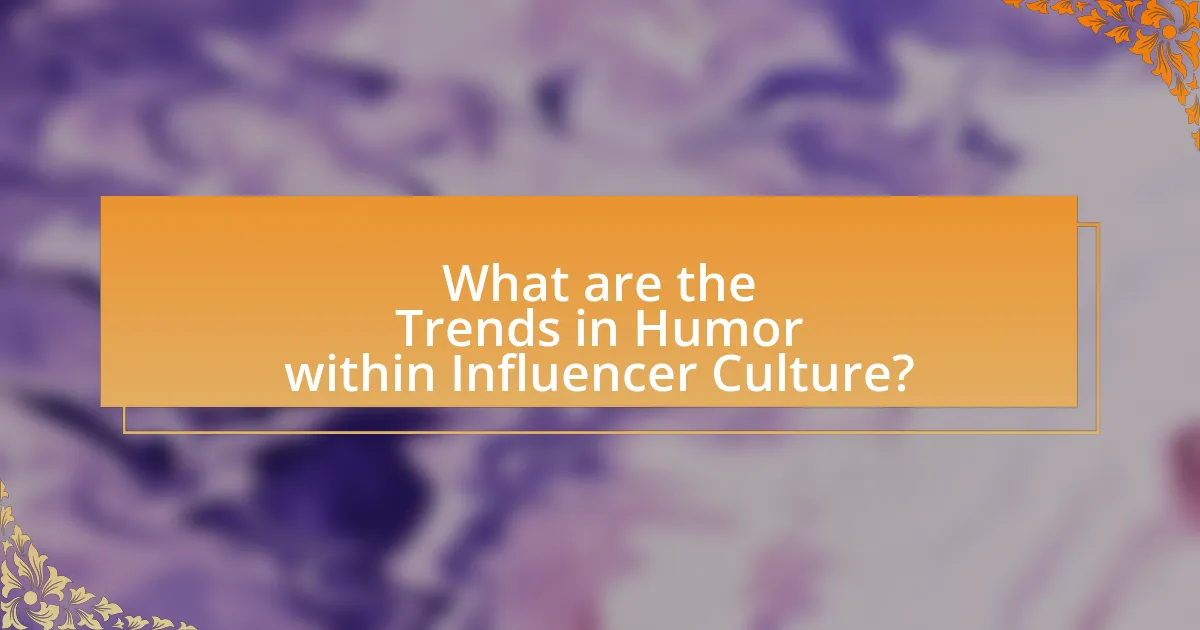
What are the Trends in Humor within Influencer Culture?
Trends in humor within influencer culture include the rise of self-deprecating humor, meme-based content, and authenticity-driven comedic styles. Influencers increasingly use self-deprecating humor to create relatability, as seen in platforms like TikTok, where creators share personal flaws or embarrassing moments, fostering a connection with their audience. Additionally, meme-based humor has gained traction, with influencers leveraging popular memes to engage followers, as evidenced by the widespread use of trending formats on Instagram and Twitter. Authenticity in humor is also crucial; influencers who present genuine, unscripted moments often resonate more with audiences, leading to higher engagement rates. This trend is supported by studies indicating that audiences prefer relatable and authentic content, which enhances trust and loyalty.
How has humor evolved in social media influencer culture?
Humor in social media influencer culture has evolved from traditional comedic formats to more personalized, relatable, and interactive styles. Initially, influencers relied on scripted jokes and polished content, but as platforms like TikTok and Instagram gained popularity, humor became more spontaneous and authentic, reflecting everyday experiences. This shift is evidenced by the rise of meme culture and the use of humor to address social issues, making it more accessible and engaging for diverse audiences. Influencers now often incorporate user-generated content and real-time interactions, enhancing relatability and fostering community engagement, which has become a hallmark of successful influencer humor.
What recent trends are shaping the use of humor by influencers?
Recent trends shaping the use of humor by influencers include the rise of authenticity, meme culture, and relatability. Influencers increasingly prioritize genuine humor that resonates with their audience, often sharing personal anecdotes or experiences that evoke laughter. This shift towards authenticity is supported by research indicating that 86% of consumers prefer brands that are transparent and relatable. Additionally, the integration of meme culture into influencer content allows for quick, shareable humor that engages younger audiences, as memes have become a dominant form of communication on social media platforms. Influencers are also leveraging humor to address social issues, making their content not only entertaining but also socially relevant, which enhances audience connection and engagement.
How do cultural shifts affect humor in influencer content?
Cultural shifts significantly influence humor in influencer content by altering societal norms, values, and expectations. As cultures evolve, influencers adapt their comedic styles to resonate with their audiences, reflecting contemporary issues and trends. For instance, the rise of social justice movements has led many influencers to incorporate humor that addresses topics like inclusivity and diversity, making their content more relatable and socially aware. This adaptation is evident in platforms like TikTok, where humor often mirrors current events and cultural dialogues, demonstrating that influencers must stay attuned to the changing landscape to maintain relevance and engagement.
What are the implications of humor trends for brands?
Humor trends significantly impact brands by shaping consumer perceptions and engagement strategies. Brands that effectively leverage humor can enhance relatability and foster emotional connections with their audience, leading to increased brand loyalty. For instance, a study by the Journal of Advertising Research found that humorous advertisements can improve brand recall by up to 50%. Additionally, humor can facilitate shareability on social media platforms, amplifying brand reach and visibility. Brands that align their messaging with current humor trends can also demonstrate cultural relevance, making them more appealing to younger demographics who prioritize authenticity and relatability in brand interactions.
How can brands leverage humor in their influencer partnerships?
Brands can leverage humor in their influencer partnerships by creating relatable and entertaining content that resonates with the audience. This approach enhances engagement, as humor is known to increase shareability and viewer retention. For instance, a study by the Journal of Advertising Research found that humorous advertisements can lead to a 20% increase in brand recall. By collaborating with influencers who have a comedic style, brands can tap into their established audience, making the content feel authentic and enjoyable. This strategy not only fosters a positive brand image but also encourages organic conversations around the brand, ultimately driving consumer interest and loyalty.
What best practices should brands follow when using humor in campaigns?
Brands should ensure that humor aligns with their target audience’s values and preferences to be effective in campaigns. This alignment fosters relatability and engagement, as humor that resonates with the audience can enhance brand perception. Additionally, brands should avoid humor that could be perceived as offensive or divisive, as studies indicate that 70% of consumers are more likely to support brands that demonstrate social responsibility. Furthermore, incorporating humor that is relevant to the product or service can create a memorable connection, as evidenced by successful campaigns like Old Spice’s “The Man Your Man Could Smell Like,” which effectively used humor to boost brand recognition and sales.
What are effective ways to engage audiences through humor in influencer content?
Effective ways to engage audiences through humor in influencer content include using relatable anecdotes, employing self-deprecating humor, and incorporating visual comedy. Relatable anecdotes resonate with audiences, as they reflect shared experiences, making the content more engaging. Self-deprecating humor allows influencers to appear more approachable and authentic, fostering a connection with their followers. Visual comedy, such as memes or funny skits, captures attention quickly and enhances shareability, increasing audience reach. Research indicates that humor can significantly boost engagement rates, with studies showing that humorous content is more likely to be shared and remembered, thus reinforcing its effectiveness in influencer marketing.
